Marvel’s First Family is back on the big screen, and this time it feels like they’ve finally found their footing. The Fantastic Four: First Steps takes us on a journey that’s equal parts thrilling, heartfelt, and visually spectacular, giving audiences a film that’s not only entertaining but surprisingly moving.
From start to finish, this Marvel Studios-produced film, which has been distributed by Walt Disney Studios Motion Pictures, is an intense experience, in the best possible way, keeping you on edge while still leaving room for moments that hit right in the heart.
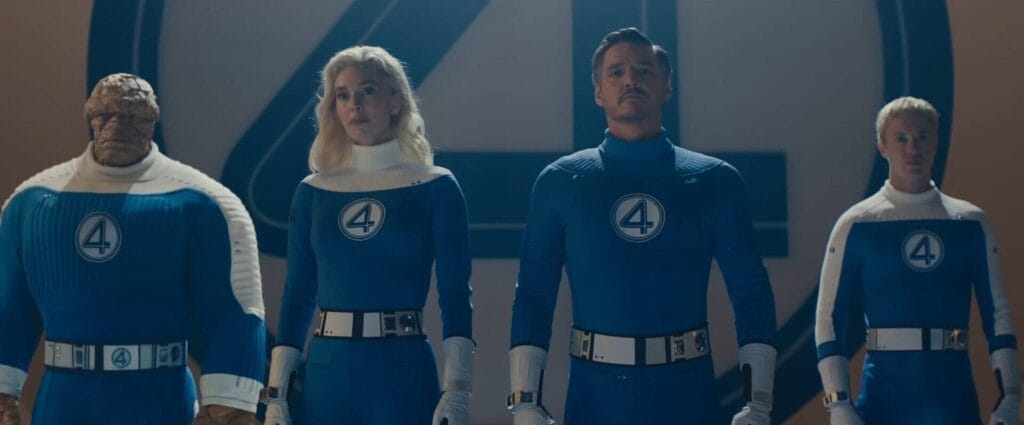
Our Thoughts on The Fantastic Four: First Steps:
A Fresh Yet Familiar Beginning
Set within the richly stylised, retro-futuristic world of Earth‑828, The Fantastic Four: First Steps wastes no time immersing us in its unique corner of the Marvel multiverse. From the very first frame, the film establishes a distinctive visual identity—one that blends vintage sci-fi optimism with modern cinematic flair. Hovercars zip past art deco skyscrapers, classic television-style displays pulse with life, and a sleek ’60s-inspired aesthetic runs through everything from the architecture to the characters’ fashion and perfectly coiffed hairstyles.
It’s both a loving homage to the past and a bold leap forward for Marvel’s storytelling. Nowhere is this retro-futuristic vision more striking than in Times Square—reimagined not with towering LED screens, but with boxy, analogue monitors buzzing with static and grainy broadcasts, creating a surreal contrast to the hyper-digital world we know today.
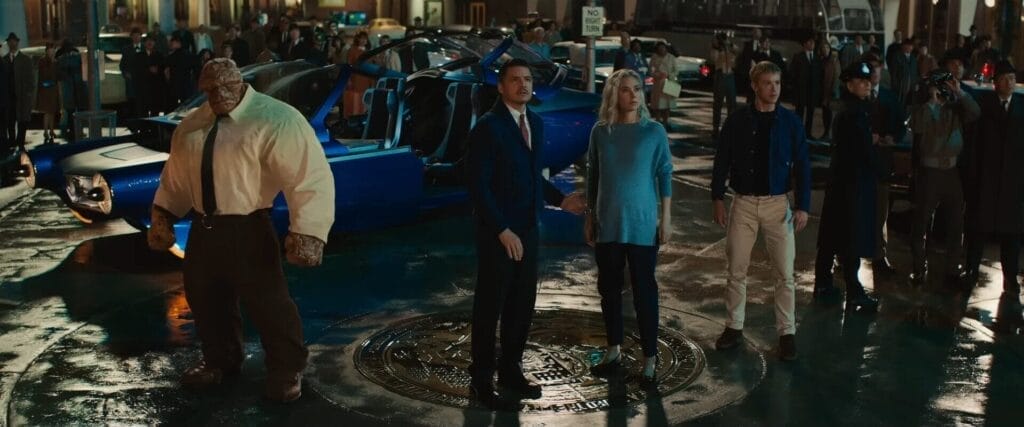
At the heart of the film is a tight-knit team of explorers—Reed Richards, Sue Storm, Johnny Storm, and Ben Grimm—who are already operating as a well-oiled unit when we meet them. Rather than rehashing yet another slow-paced origin story (which we’ve already seen play out in the 2005 film and the 2015 reboot), First Steps wastes no time and throws us straight into the action.
These characters are established, capable, and respected figures in their universe, which gives the film room to explore deeper emotional and moral complexities right from the outset. Don’t worry, though, there’s a smartly placed segment that refreshes audiences on how the Fantastic Four came to be, making it perfectly accessible for newcomers without slowing down the momentum.

The team’s familial bond is portrayed perfectly on-screen before the Silver Surfer descends with an ominous message: the world is marked for destruction by the planet-consuming entity known as Galactus. As they hurtle through stylish interstellar set pieces, we witness not only sweeping cosmic action but also the mounting tension at home—Sue’s pregnancy turns the mission from heroic adventure into a deeply personal struggle. When Galactus arrives, he delivers a haunting ultimatum that tests their commitment to one another and all of humanity. It’s a thrilling mix of caregiving and courage, of sacrifice and defiance, all wrapped in a cosmic threat that demands both resilience and innovation.
That tension—between the human and the cosmic—becomes the film’s emotional backbone. First Steps doesn’t just pit the team against Galactus; it challenges each of them internally. The spectacle never overshadows the soul. Johnny Storm begins to unravel under pressure, masking fear with bravado. Ben Grimm carries the quiet weight of his irreversible transformation. Sue Storm, caught between the responsibility of saving the world and the uncertainty of impending motherhood, anchors the film with both vulnerability and strength.
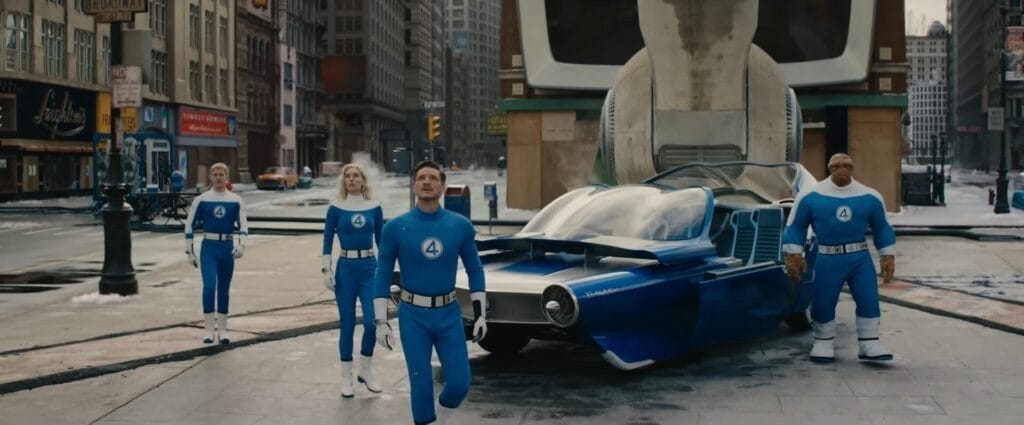
And, at the centre of it, all is Reed Richards, torn between his duty as a scientist and his role as a partner and future father. His arc, shaped by guilt, intellect, and impossible decisions, gives the narrative a grounded intensity. These moments of introspection aren’t pauses in the action; they’re what give the action meaning. The film’s brilliance lies in how it balances the unimaginable scale of its threat with the intimate struggles of four people trying to hold onto their humanity.
There’s an intensity that runs through the entire film, but it never feels overwhelming. The pacing is sharp, and the stakes remain high without losing sight of the story’s heart. The narrative manages to juggle sci-fi, superhero thrills, and moral dilemmas without collapsing under its own ambition. A feat that deserves real credit.

Ultimately, The Fantastic Four: First Steps delivers a compelling and emotionally resonant story that doesn’t rely on nostalgia alone to carry its weight. It embraces what makes these characters iconic, their sense of wonder, their complicated humanity, and their unbreakable bond, and builds something new and powerful from that foundation.
Performances That Shine
The casting for this reboot is easily one of its strongest elements. Pedro Pascal’s portrayal of Reed Richards / Mister Fantastic offers both intellectual sharpness and emotional vulnerability, showing a leader torn between scientific ambition and the reality of becoming a father. Vanessa Kirby’s Sue Storm / Invisible Woman is the emotional core of the movie, bringing strength, warmth, and depth to a role that could easily have been overshadowed by the action.
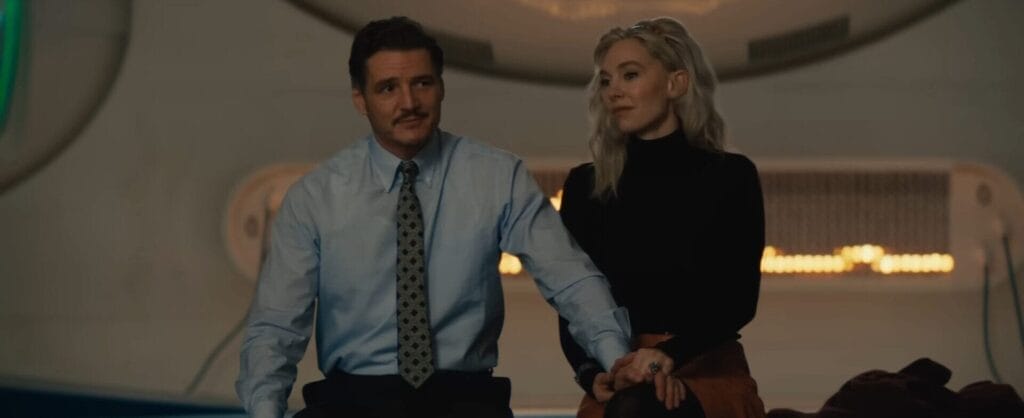
Joseph Quinn as Johnny Storm / Human Torch is electric, delivering charm, humour, and flashes of genuine emotion when the stakes rise, not to mention adding male eye-candy which is always a bonus from this character, like we all drooly remember Chris Evans as Johnny Storm in the original Fantastic Four film. Ebon Moss‑Bachrach’s Ben Grimm / The Thing adds grounding and humanity to the team, with his gruff exterior masking a character full of heart.
Nestled among the story’s heart and heroism is H.E.R.B.I.E., the slightly put-upon yet undeniably charming robot companion voiced by Matthew Wood. Created by Reed Richards, H.E.R.B.I.E. brings levity and loyalty to the team, helping ground the film’s retro-futuristic world in warmth and wit.
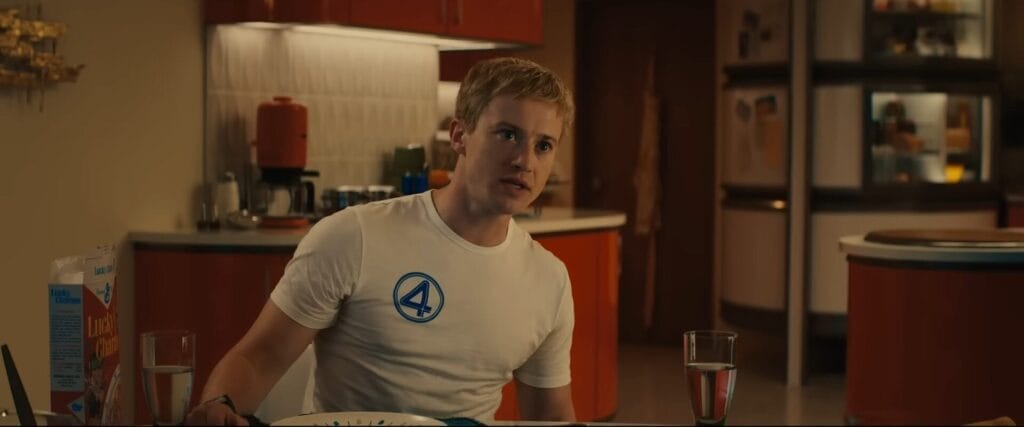

Julia Garner as Shalla-Bal / Silver Surfer brings an unexpected layer of sorrow and dignity to the role, making her scenes hauntingly memorable. Her quiet defiance and mournful presence give weight to every interaction, particularly in moments tied to her master.
That connection becomes even more compelling thanks to Ralph Ineson as Galactus. His deep, resonant voice doesn’t just command attention; it reverberates through the film like a force of nature, lending the character a weight that goes far beyond visual spectacle. The combination of his imposing vocal delivery and the film’s striking visual design makes Galactus feel both terrifyingly alien and hauntingly inevitable, ensuring his shadow looms over every scene, even when he’s not on screen.

Style, Direction, and Emotional Weight
Director Matt Shakman clearly had a vision to make this film more than just another superhero outing. There’s a deliberate balance of big‑screen action and intimate character drama, and that contrast gives the story its pulse. Some might argue that the film’s structured plot doesn’t allow for deep exploration of side characters, but that focus on the central four keeps the narrative tight and emotionally engaging. It’s this streamlined approach that helps maintain the movie’s intensity from start to finish.
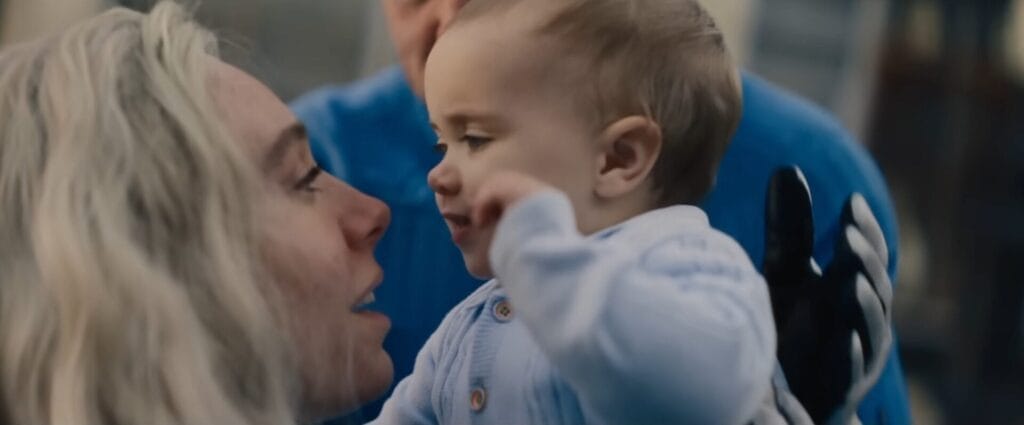
Visuals and Score That Elevate the Experience
Visually, the film is stunning. The retro aesthetic of the sets and costumes creates a unique look that blends space‑age optimism with modern spectacle. Galactus, when finally revealed, is truly awe‑inspiring in scale—a cosmic presence that feels as threatening as it is magnificent. The action sequences are fluid and exciting without falling into chaotic CGI overload, and each character’s powers are showcased in creative ways that make even familiar abilities feel fresh.
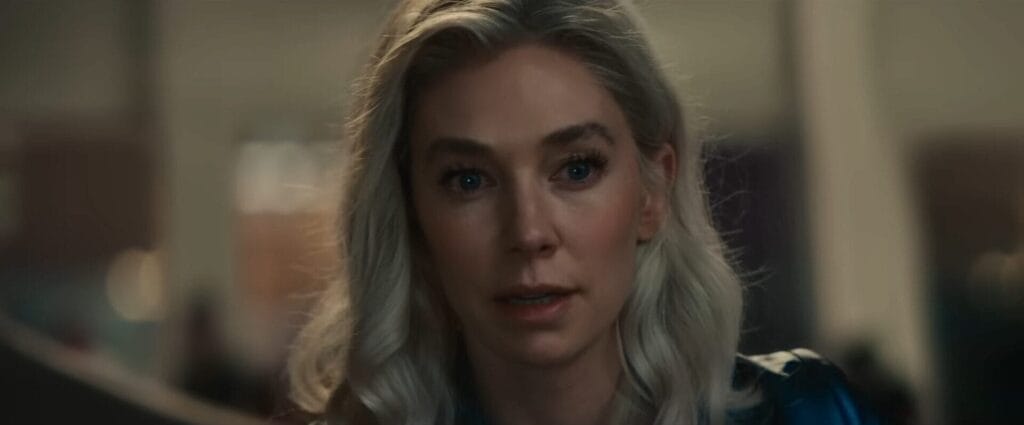
Michael Giacchino’s score is the film’s beating heart, weaving retro-futuristic flair with modern Marvel grandeur. The triumphant main theme bursts to life with brass and a soaring choir, even vocalising “Fantastic Four!” in a bold nod to classic heroism. From tender string-led moments to eerie cosmic undertones, the music amplifies both the spectacle and the intimacy, ensuring the emotional beats land just as powerfully as the action.
Themes That Resonate
What sets The Fantastic Four: First Steps apart is its ability to ground cosmic action in relatable emotion. At its heart, this is a story about family, sacrifice, and the weight of responsibility—ideas that are universal and timeless. The impending arrival of a child isn’t just a plot point; it’s a powerful driver of the decisions these characters make, and it adds resonance to every high‑stakes moment.
A Reboot Worth the Wait
Over the years, the Fantastic Four has struggled to find its place on screen, with previous adaptations failing to capture the magic of Marvel’s original super‑team. First Steps finally changes that. While no movie is perfect, and some viewers might wish for more exploration of side characters or certain subplots, the film succeeds in delivering a compelling, emotionally charged adventure that breathes new life into the franchise.
The Legacy Begins Here
The Fantastic Four: First Steps isn’t just another superhero film; it’s a thrilling space‑age epic anchored by characters you genuinely care about. It manages to be both nostalgic and forward‑thinking, intense without being exhausting, and heartfelt without feeling forced. Whether you’re a longtime Marvel fan or new to the Fantastic Four’s world, this is a cinematic journey worth taking.
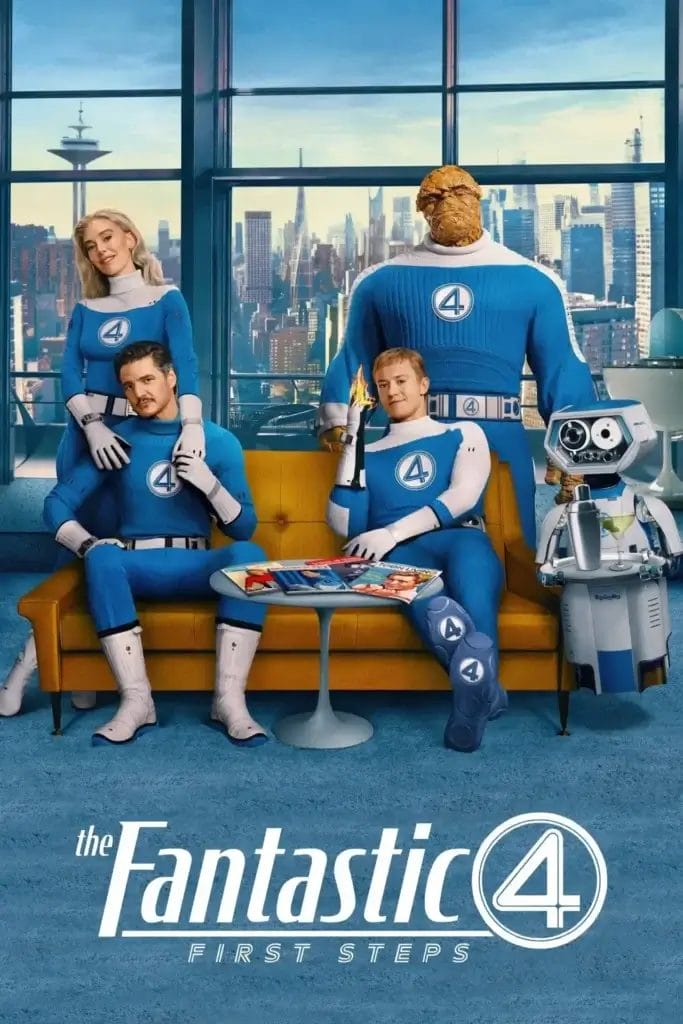
Follow Fantastic Four on social media here:
Follow Marvel on social media here:
Share this article and tag us @GoodStarVibes to let us know what you make of our film review of The Fantastic Four: First Steps.
Have any thoughts?
Share your reaction or leave a quick response — we’d love to hear what you think!








